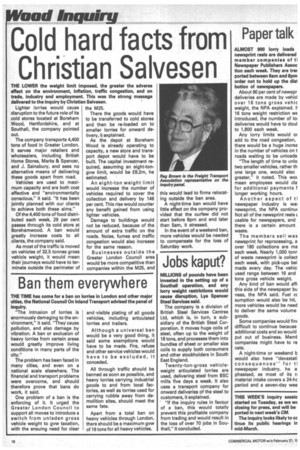Ban them everywhere
Page 12

If you've noticed an error in this article please click here to report it so we can fix it.
THE TIME has come for a ban on lorries in London and other major cities, the National Council On Inland Transport advised the panel of inquiry.
"The intrusion of lorries is enormously damaging to the environment," it said. "They cause pollution, and also damage by vibration. A ban or exclusion of heavy lorries from certain areas would greatly improve living conditions in many parts of the city."
The problem has been faced in many cities, and even on a national scale elsewhere. The financial and transport problems were overcome, and should therefore prove that bans do work, it said.
One problem of a ban is the enforcing of it. It urged the Greater London Council to support all moves to introduce a switch from unladen gross vehicle weight to gvw taxation, with the ensuing need for clear and .visible plating of all goods vehicles, including articulated lorries and trailers.
Although a universal ban would be a very good thing, it said some exemptions would have to be made. Fire, refuse and other service vehicles would have to be excluded, it conceded.
All through traffic should be banned as soon as possible, and heavy lorries carrying industrial goods to and from local factories, as well as lorries used for carrying rubble away from demolition sites, should meet the same fate.
Apart from a total ban on heavy vehicles through London, there should be a maximum gvw of 16 tons for all heavy vehicles.


















































